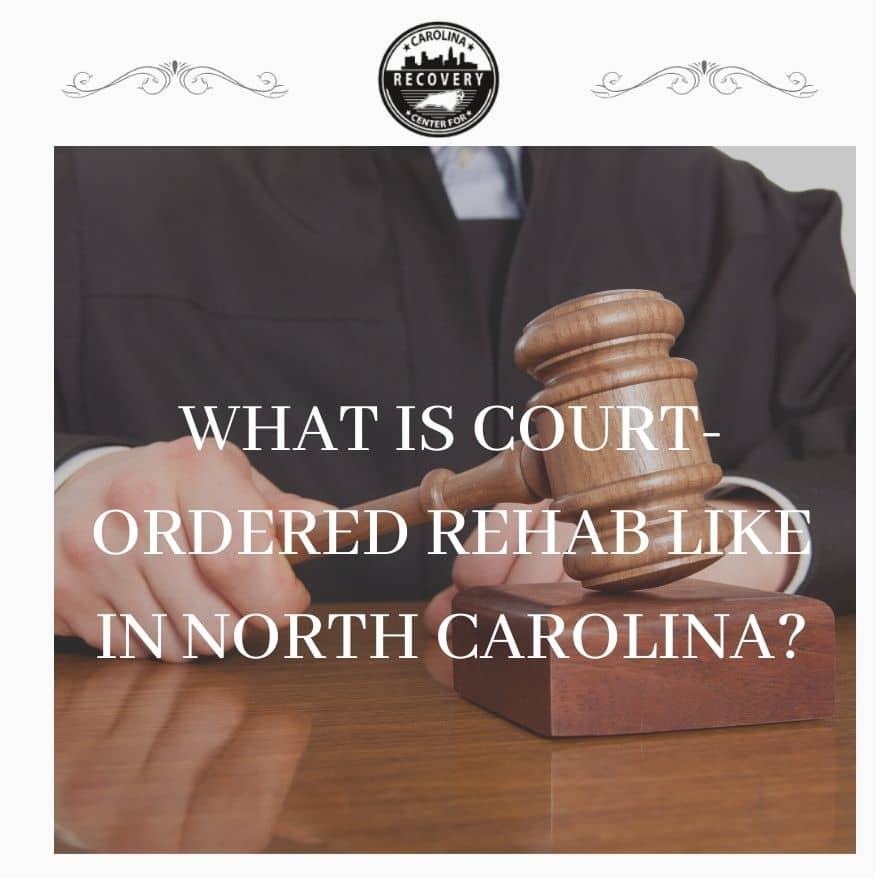What is Court-Ordered Rehab Like in North Carolina?

Medically Verified: 2/1/24
Medical Reviewer
Chief Editor

All of the information on this page has been reviewed and verified by a certified addiction professional.
Substance abuse and addiction involve more than just irresponsible and compulsive use of substances. Addiction is a health condition that affects the way people think, behave, and interact with others. In many cases, especially among young adults, social misconduct, crime, and addiction go hand-in-hand. Lucky individuals will be given the option to complete court-ordered rehab rather than going to jail or prison.
Addiction can drive people to engage in various crimes. Some of the most common include drunk or drugged driving (DWI/DUI), petty theft, drug possession, or illicit drug distribution. Even offenses that don’t deal with drugs or alcohol–such as burglary, violence, or fraud–are often driven by illicit substances or an addiction to alcohol.
According to the National Institute on Drug Abuse (NIDA), an estimated 65% of the U.S. prison population has a substance use disorder. Another 20% do not meet the diagnostic criteria for substance use disorder, but they were reportedly under the influence when their crime was committed.[1]
While jail or prison is often involved in the sentence given to people who commit serious crimes, decades of research have proven that people who receive substance abuse treatment while incarcerated are less likely to repeat offenses than those who do not.[1] Treatment during incarceration can reduce overall crime by helping individuals break free from their addiction and addictive behaviors. As a result, judges sometimes give criminal offenders the option to participate in court-ordered rehab.
What is Court-Ordered Rehab?
Court-ordered rehab is a type of mandatory addiction treatment that is ordered by a judge as part of their court ruling. There are many instances during which court-ordered rehab is used, including:
- Alongside a jail or prison sentence
- Instead of a jail or prison sentence
- When ordered as part of involuntary commitment for someone who refuses to go to rehab voluntarily
Court-mandated addiction treatment is typically reserved for people who committed a drug-related crime or someone whose addiction clearly drove them to engage in illegal behaviors. Violent offenses, however, are more likely to send a person to jail than to rehab. Oftentimes, people who are addicted to alcohol or other drugs have impaired judgment, and they commit relatively minor crimes. These individuals may have no prior charges and upstanding character, so the judge may think they are better suited for rehab rather than jail or prison.
What is Court-Ordered Rehab Like in North Carolina?
The actual treatment process during court-mandated rehab is similar to that of a regular treatment program. It involves detox to stabilize patients medically, group and individual therapies to help them heal from addiction, and aftercare planning to pave the way for a sober future.
The main difference between court-ordered treatment and voluntary treatment is that people can be arrested if they leave rehab early or against medical advice. While other patients may be able to leave the facility whenever they please, the same is not true for people who are ordered to rehab by a judge.
The goal of court-ordered treatment is to help criminal offenders break the cycle of crime by addressing the root cause of their crime: their addiction. Treatment can help offenders get sober, develop healthy lifestyle habits, and find a passion for life that can help deter crime.
Why Pays for Court-Ordered Addiction Treatment?
The person sentenced is the person who is responsible for paying for treatment, even when it is mandated by a judge. However, they can choose any facility they want so long as it meets the judge’s guidelines. This allows individuals to choose a rehab center that is in-network with their insurance so they only have to pay out-of-pocket costs.
Offenders will also be responsible for paying court fees, fines, and attorney fees.
What Happens if an Offender Leaves Mandatory Rehab Early?
If a judge has sentenced a person to go to rehab, they must complete the program they are supposed to attend. These terms are set forth by the court system, and, if broken, can lead to criminal prosecution. Offenders who do not complete their mandatory treatment sentence may be taken to jail or prison to complete their sentence under lock and key. They may also be responsible for paying any fines related to their offense.
If treatment is completed successfully, charges may be dropped, especially in misdemeanor or nonviolent crimes. The crime may also be expunged from a person’s record, giving them a chance to have a clean slate after serving their sentence.
Find The Support You Need Now, Not Later
If you are struggling with addiction, it is only a matter of time before the consequences of your behaviors catch up to you. There is a common saying in 12-Step groups that addiction only leads to jails, institutions, or death, but there is an alternative: sobriety.
Don’t wait any longer to get the life-changing care you deserve. Call now to speak with a team member at Carolina Center for Recovery. We’re here to help.
References:

